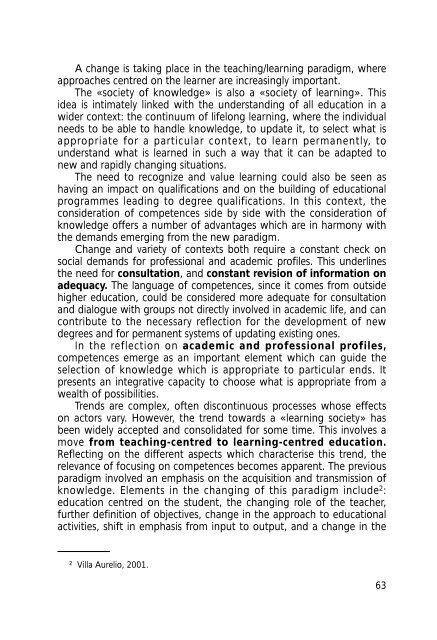Final Report Pilot Project - Relaciones Internacionales de la ...
Final Report Pilot Project - Relaciones Internacionales de la ...
Final Report Pilot Project - Relaciones Internacionales de la ...
You also want an ePaper? Increase the reach of your titles
YUMPU automatically turns print PDFs into web optimized ePapers that Google loves.
A change is taking p<strong>la</strong>ce in the teaching/learning paradigm, where<br />
approaches centred on the learner are increasingly important.<br />
The «society of knowledge» is also a «society of learning». This<br />
i<strong>de</strong>a is intimately linked with the un<strong>de</strong>rstanding of all education in a<br />
wi<strong>de</strong>r context: the continuum of lifelong learning, where the individual<br />
needs to be able to handle knowledge, to update it, to select what is<br />
appropriate for a particu<strong>la</strong>r context, to learn permanently, to<br />
un<strong>de</strong>rstand what is learned in such a way that it can be adapted to<br />
new and rapidly changing situations.<br />
The need to recognize and value learning could also be seen as<br />
having an impact on qualifications and on the building of educational<br />
programmes leading to <strong>de</strong>gree qualifications. In this context, the<br />
consi<strong>de</strong>ration of competences si<strong>de</strong> by si<strong>de</strong> with the consi<strong>de</strong>ration of<br />
knowledge offers a number of advantages which are in harmony with<br />
the <strong>de</strong>mands emerging from the new paradigm.<br />
Change and variety of contexts both require a constant check on<br />
social <strong>de</strong>mands for professional and aca<strong>de</strong>mic profiles. This un<strong>de</strong>rlines<br />
the need for consultation, and constant revision of information on<br />
a<strong>de</strong>quacy. The <strong>la</strong>nguage of competences, since it comes from outsi<strong>de</strong><br />
higher education, could be consi<strong>de</strong>red more a<strong>de</strong>quate for consultation<br />
and dialogue with groups not directly involved in aca<strong>de</strong>mic life, and can<br />
contribute to the necessary reflection for the <strong>de</strong>velopment of new<br />
<strong>de</strong>grees and for permanent systems of updating existing ones.<br />
In the reflection on aca<strong>de</strong>mic and professional profiles,<br />
competences emerge as an important element which can gui<strong>de</strong> the<br />
selection of knowledge which is appropriate to particu<strong>la</strong>r ends. It<br />
presents an integrative capacity to choose what is appropriate from a<br />
wealth of possibilities.<br />
Trends are complex, often discontinuous processes whose effects<br />
on actors vary. However, the trend towards a «learning society» has<br />
been wi<strong>de</strong>ly accepted and consolidated for some time. This involves a<br />
move from teaching-centred to learning-centred education.<br />
Reflecting on the different aspects which characterise this trend, the<br />
relevance of focusing on competences becomes apparent. The previous<br />
paradigm involved an emphasis on the acquisition and transmission of<br />
knowledge. Elements in the changing of this paradigm inclu<strong>de</strong> 2 :<br />
education centred on the stu<strong>de</strong>nt, the changing role of the teacher,<br />
further <strong>de</strong>finition of objectives, change in the approach to educational<br />
activities, shift in emphasis from input to output, and a change in the<br />
2 Vil<strong>la</strong> Aurelio, 2001.<br />
63


